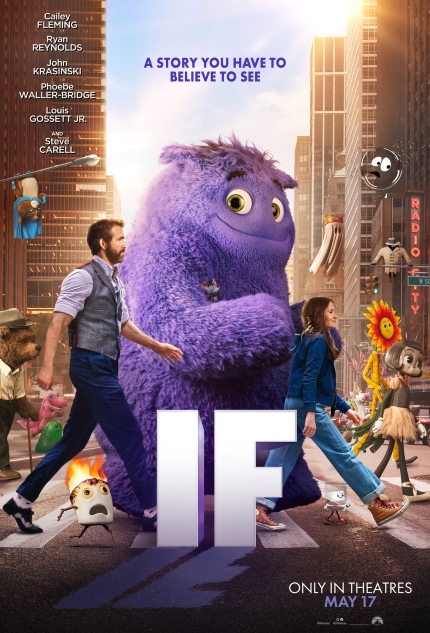IF Review: John Krasinski's Muddled, Moving Fantasy-Drama
Ryan Reynolds stars in writer/director John Krasinski's latest film.

With major back-to-back box-office hits, writer-director John Krasinski (The Quiet Place I and II, The Hollers) found himself in a rare, rarefied position, a virtual blank check from the studio to make practically anything he wanted.
Rather than another action-oriented, adult-oriented film, however, Krasinski decided to write and direct a personal project near and dear to his heart, If, a middling, muddled, sometimes moving fantasy-drama made with his two daughters foremost in mind.
While unironically heartfelt, earnest, and poignant in equal amounts, If repeatedly suffers, not from a shortage of narrative ideas and themes, but an overabundance of them. Overflowing with fascinating, albeit underdeveloped, ideas about grief, loss, and, of course, the power of imagination to offer comfort and aid in healing from trauma, If frustrates as much as it moves emotionally, carrying the audience along on the central character’s universally relatable journey.
That journey centers on Bea (Cailey Fleming), a preteen recovering from the tragic loss of her mother to cancer and the possible loss of her father (John Krasinski) to a serious, if unspecified, heart issue requiring imminent surgery. (Far from realistically, his gold-plated health insurance allows him to spend several days in the hospital before surgery.)
That leaves the lonely, friendless Bea in the distracted, distractible care of her grandmother (Fiona Shaw) at the same Brooklyn Heights brownstone where Bea spent earlier, happier times with her parents, memories conveniently recorded on videos initially seen in If’s opening moments. A box of mementos left behind also stirs Bea’s memories, not always for the good.
In one of If’s many dubious, eyebrow-raising moments, Bea’s grandmother leaves her unsupervised during the day between hospital visits. That allows Bea to enter and return to her grandmother’s apartment at any time or hour of the night.
She also wanders the hallways and staircases of the multi-story brownstone until she inevitably meets an upstairs neighbor, Calvin (Ryan Reynolds), after chasing a mysterious non-human figure, Blossom (Phoebe Waller-Bridge), to the top floor of the brownstone. A cross between Betty Boop and a butterfly, Blossom, originally the product of a child’s overactive imagination, lives with Calvin and another imaginary friend (Ifs as they’re referenced in the film and title), Blue (Steve Carell), a giant, attention-starved purple non-people eater.
Unlike most adults, Calvin, like Bea soon discovers for herself, can see imaginary friends. Even worse, they can see him and expect him to help with their day-to-day problems. More of a curse than a gift, Calvin hopes to find new children for his long-abandoned Ifs. He’s not particularly successful.
One such failed effort comes to the attention of the ever-perceptive Bea, leading to their formal meet-and-greet and later, when Bea, in obvious need of emotional support as she struggles with potentially losing her father, a new task: matching not just Blossom and Blue with new children, but an entire retirement home under Coney Island filled with long-abandoned Ifs.
How the Ifs arrived at the retirement home, how it was started or maintained, or even the thorny issue of how long Ifs survive after being abandoned by the children who conjured them never comes up in Krasinski’s film, a sloppy bit of world-building that serves as an example of Krasinski’s approach to storytelling. For Krasinski, emotion always trumps logic, but for moviegoers with even a slightly discerning or critical attitude toward If, once multiple questions go unanswered, it becomes difficult to invest in If’s inevitable outcome, regardless of how moving wants it to be.
It’s even more disappointing when — and where — If’s performances are concerned. As Bea, Fleming credibly goes through an impressive range of emotions, grounding an otherwise fantastical, nonsensical story in relatable stakes.
Setting aside his usual hyperkinetic style, Reynolds gives a surprisingly understated performance tinged with currents of melancholy. The source of that melancholy and its resolution provide If with the obligatory emotional through-line, Krasinski foreshadows haphazardly early on, forgets for long stretches, then brings back for the heart-tugging finale underlined by composer Michael Giacchino’s perpetually present, over-emphatic score.
If opens today, only in movie theaters. Visit the official site for locations and showtimes.







